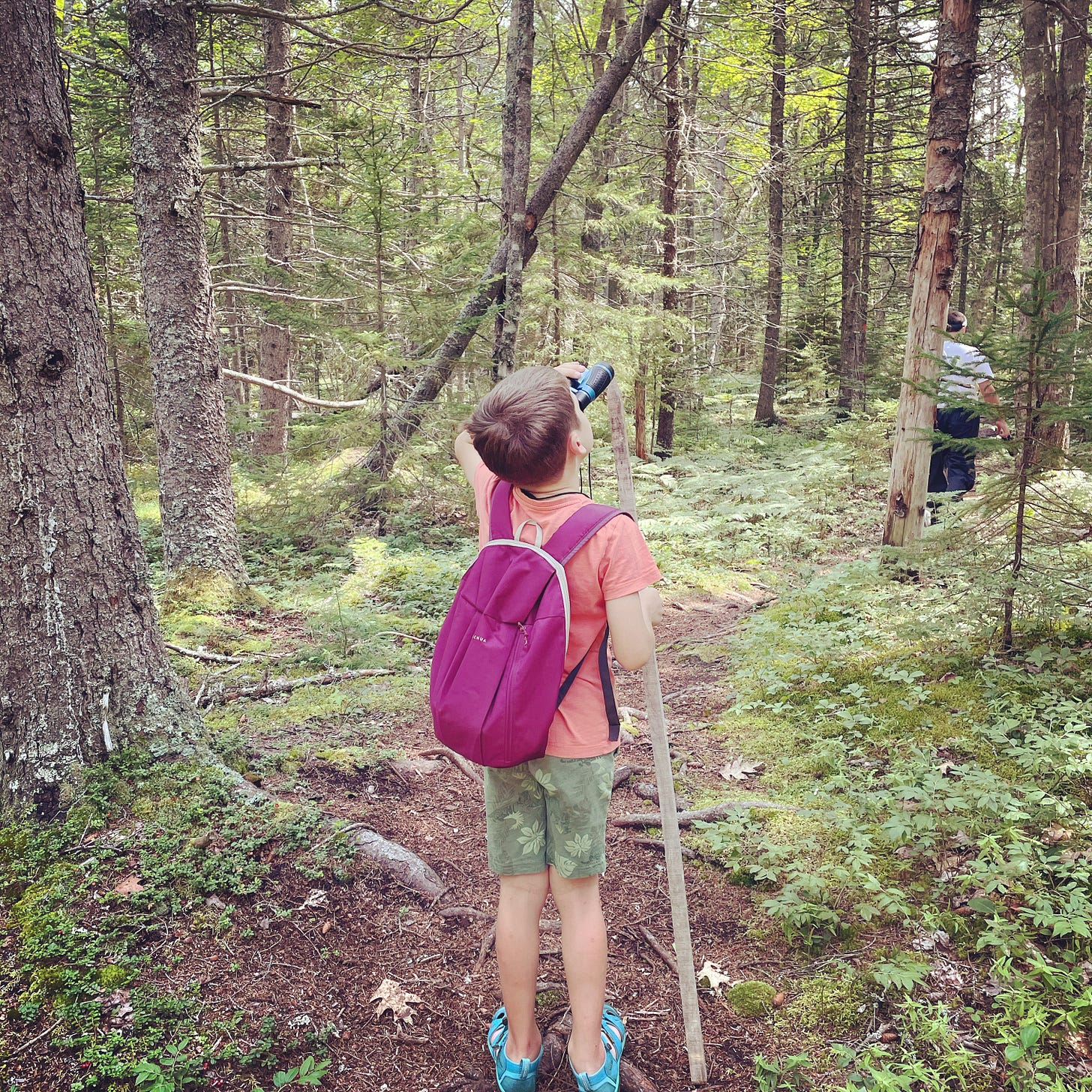"I can't wait for them to go back to school"
How do we call out adultism without shaming parents?
It’s that time of year again, and my feeds are full of back to school memes and reels. My inbox is crammed with companies telling me I should be getting my kids ready for their inevitable return. People ask my children when they start school again, and what grade they will be in.
In certain motherhood circles, the “I can’t fucking wait for them to go back” energy is high. And the conversations about how our children are delightful but also can we be rid of them already are rampant.
In other circles, it's just assumed that it’s happening and people swap tips on how to be prepared, what to say to your children, quick meals, and so on. This year, I’ve also noticed more voicing of how actually stressful it all is, and I want to acknowledge this because it’s true: some of us may be filled with glee at the prospect of our children in school, but others (me) would rather spend all day with them than have to pack lunches, wake up at the crack of dawn, make sure everyone has all the things and is also physically and emotionally okay, five days a week.
With all the many iterations of Back to School talk, nowhere do I see children’s perspectives being centred or respectfully voiced.
And I’m left wondering, How do we talk about what children want, what respectful relationships with children look like, what parenting without dominating might mean, without also feeling like we are shaming or guilting parents for their individual actions? For feeling like they need time away from their children?
Don’t get me wrong, once upon a time I too couldn’t wait for my children to go back to school, or perhaps i couldn’t wait for the weekend to come around so I could have a day to myself.
Us caregivers wanting time to ourselves is NOT what is being critiqued here - it is absolutely normal to want a quiet home on occasion, to want to spend time doing something other than caretaking or being around our children no matter how delightful they might be. If you have kids and you have never wished this - this post is not for you.
I’m willing to bet the majority of us have whispered this to ourselves, thought this, said it out loud to our friends and partners maybe. It’s not because we want to get rid of our kids, but because life is hard and the way most of us live is untenable. Many of us are isolated, lack a support system, and have to work long hours both at home and outside of it. We need our children to go somewhere and when that somewhere opens up again, we are relieved. We should not feel guilty for feeling this way.
And, I think what bothers me about all of the so-called parenting humour, especially online but also in everyday interactions, that makes children the butt of the joke is that it is public, and often right in front of said children, and that it is punching down.
If my husband made constant jokes, both with friends and online, about how he couldn’t wait to be rid of me, how I ruined every holiday, how he was going to celebrate when I finally went back to work, it might begin to feel uncomfortable. Especially if I didn’t also have access to a platform to get back at him with.
If I posted publicly about the things that my children do that annoy me, and my children saw it, it would feel hurtful to them. No amount of gaslighting them with “but it’s only a joke!” would make it better.
Just because something is funny, and a little bit true, doesn’t mean we get to put it online. If the thing also happens to play on adult biases against young people and make them the butt of the joke, then it just doesn’t feel right.
In fact, it’s adultism plain and simple.
In a sense, the question of how we talk about adultism without adults feeling shamed is the same question that we find ourselves asking in multiple contexts where imbalances of power, and therefore abuses of power, exist. How do we call out white supremacy without white people getting defensive, how do we call out misogyny without men feeling personally attacked?
My answer is: it’s not personal, get over it. And, it’s not personal, we need to put heavier focus on systems than individuals. And, it’s not personal, but adults need to recognise when we are complicit.
It seems that many of us are unable to take criticism of the ways we use our adult power over children in the same stride as we might take critiques around our other biases and potentially problematic actions.
This post was inspired by a note by
that said this:This is a perfect example of the way that pointing out that children have rights, and that while education is a right, schooling might not be, feels immediately like we are triggering adult’s fragility.
Partly it might be because our (especially those of us who are mothers) identity, sense of purpose, work and sometimes actual freedom is so bound up with our children’s. And if you’ve lived in the West long enough, you might start to believe that your own autonomy, creative freedom and liberation are in opposition to those of your child. In this context, I suppose it would be triggering to hear that no, school is not ideal for all children and that yes, it is a fundamentally adultist institution.
I tend to tread carefully when critiquing both school as a place and schooling as a system, because I know that there are a multiplicity of truths at play: schooling is a Western, adultist construct, and also we all exist in society and many of us have no choice but to rely on school as a place, or schooling as a structure that promises future success. Yes, schools often don’t respect the rights of children - this is a fact. If you scan through the United Nations Convention for the Rights of the Child, and then look at the average school in pretty much any country, the contrasts will most likely be very apparent.
Pointing this out however, is tricky, and I think that is because children are not seen as full people with the right to have a say in their daily lives. They are not viewed as holders of rights in the same sense adults hold rights. Often, saying that children have a say in decisions feels confronting because people immediately rush to absolutes (“They can’t make all the decisions!!”), when in fact this simply means that children should genuinely get a seat at every table where decisions are made, whether that is at home, school, or the doctor’s office.
The adults want to be able to publicly joke about children, while also spending zero time reflecting on whether children are actual people.
Until children are seen as full people, and until we acknowledge that adult society is inherently biased towards them, it will continue to be acceptable to treat children poorly in public, to make them the butt of jokes online, and to say things that if they were said about any other group of marginalised people, would be denounced.
“I can’t wait for my children to be back in school” sounds harmless, but in the context of a society where it is acceptable to publicly say things like, “I hate children” or “Children need to be told what to do because their brains are underdeveloped”, and where it is completely normal to force children to comply with school rules and adult whims, this statement isn’t really that funny. In the context of a society where children are powerless, all of these things are harmful, even oppressive.
The conversation we could be having might be a much more expansive one. We could be talking about the ways school is inherently authoritarian, and how this could be changed. We could be talking about the ways children might choose to grow up and exist outside of the confines of full-time schooling - this could look so many ways and it doesn’t have to look like full-time homeschooling! We could be talking about the ways to make non-school settings more viable; how to support them, how to make them accessible to more children, how to funnel public funding towards more humane, rights-based options.
This conversation begins with Kristin’s question above, but it shouldn’t end with parents feeling shamed - it is no individual person’s fault that adultism is normalised and pervasive, that mainstream school is our main, free, easy option. It is no individual caregiver’s fault, AND we can collectively do something about it.
Once we’re done being triggered, we could pause for a second and look at the ways that we hold biases against children as a group. We could dig deeper into why we assume things about who children are and how they learn and what they should be doing with their lives, and whether those assumptions are based in reality and fact (a lot of the time, they are not.) We could look at the ways society is structured to segregate, exclude and disempower children, from the lack of support for mothers and parents, to the push for children to be institutionalized, to the ways children are treated and controlled in and sometimes banned from public spaces, to the lack of regard for children’s actual safety both at home (back to school shootings, anyone?) and abroad (children in Gaza continue to be killed and starved by Israeli and US policies).
Instead of rejecting actual realities because they make us feel uncomfortable, we could start calling out adultism when we see it - online, out in public, within our extended families, in government policy, in our current culture wars.
If you want to dig deeper into adult bias against children, I highly recommend Eloise Rickman’s book It’s Not Fair for a really well-researched, deeply nuanced perspective on the ways we treat children and what young people deserve.
In Chapter 7 of my book, I talk more about adultism.
And some other posts you might be interested in:
Supporting children's rights in 2025
(this post is long, it may not fit in your email - click on the link and read it online)
Thanks for reading!
I know I’ve been fairly absent for a couple months.. I’m going through some health stuff that is making focusing on writing really hard. Thank you for bearing with me!
And if you got to the end of this post tell me, what is your current (Not) Back to School mood? Do you have big plans, or does life just carry on?









Thank you Fran for such a thoughtful and nuanced piece. Isn’t it interesting that when we bring up the rights of children or when we question norms about the way we talk about children, for example, the focus always immediately goes back to the parents, i.e., you are “parent-shaming.” This deflects the original question about how we treat children and makes it all about the parents!
This is the first summer holiday in which I can’t wait for my kids to return to school because I’m genuinely excited for them ! Having found a wonderful progressive school that they joined for a couple of months ar the end of last academic year we are all feeling excited and hopeful for September. Previously this time of year has been so hard . One child particularly would be feeling really anxious which would translate to very difficult behaviour so we’d be stuck in this awful place of desperate for time out - but knowing that time awat from us was the thing making her feel so awful. The relief of feeling a calm excitement is just such an immense joy . I just wish every family could feel as confident in their children’s school as we do at the moment ❤️